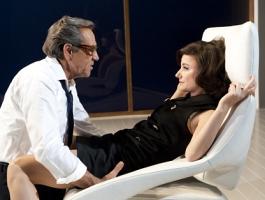Onassis
A pseudo Greek theatrical travesty based on the life of Aristotle Onassis is the essence of this gut-wrenchingly dreadful piece of detritus. One can only presume it was penned and planned in the same (short) session, probably on a boring Sunday evening in a seedy Greek taverna.
One of Onassis's side-kicks starts the proceedings by filling-in some of the excruciatingly complex detail about the connections between Onassis and the huge numbers of toffs he slept with as well as the businessmen and associates with unpronounceable Greek names who also slept with the same women. It's all too overwhelming to be taken seriously - even if it is actually true - and the network diagram which magically appears all over the set like graffiti drawn by Banksy on an off-night did little to help clarify things.
Now I am certainly not one to support the spurious activities of the super-rich. You don't, at least in my book, get to be super-rich without either being a downright bastard or else daddy leaving you a whacking pile of cash. So, I have to assume that Onassis was of the former variety, and he's certainly painted in that style throughout this play. Here, though, Onassis is little more than an overbearing, unpredictable and rather childish buffoon. The idea that such a person could negotiate deals with anyone other than a mentally retarded blind mute simply beggars belief.
Conspiracy theorists and gossip lovers will be intrigued by the allegations that Onassis had Robert Kennedy bumped off, but possibly not so keen to know that Onassis's skills as a lover were learned while being buggered during a gay relationship with a Turkish soldier.
Gods are invoked and/ or referenced in this play more times than ferries have sailed out of Greek harbours, and there's an odd kind of chorus at the back of the stage comprised of Onassis's underlings, his children's nannies and other hangers-on - many of whom we never get to know. This Greek taverna chorus repetitively bursts into song at the sight of a bouzouki and prance around while the platform they're ensconced on slides back and forth like a snake's tongue repetitively sniffing the air.
Onassis might have had billions, but the production budget here was obviously much more modest. Opulence is certainly not on offer. Katrina Lindsay's design was about as basic as it could possibly have been - mostly bare apart from the sliding tongue at the back of the set, and a couple of large sliding doors and some projections of waves. Oh, but there's a stream - yes, a real stream - flowing inexplicably across the apron.
The repetition also comes to the fore in Robert Lindsay's performance as Onassis. Every few minutes he lapses into his Zorba dance - or was it the twist? - I couldn't make up my mind about that one. And if he had dipped his hand into the stream just one more time, I would have screamed. In fact, I almost did scream (with laughter) when, on learning that his son has been killed, Mr Lindsay suddenly falls on the floor, feigning grief. Oh dear! I'm afraid that was simply embarrassing.
There really is nothing in this play to redeem it. Truly, nothing. It is, in every sense, nauseatingly dire. Now maybe, just maybe, this was how it was meant to be - a kind of pseudo comedy or farce which intended to lampoon Onassis and his lifestyle. I might just buy that. But the script isn't written that way, and the performances don't read like that either. So that particular conspiracy theory doesn't hold water - or even Retsina for that matter.
I am simply astonished that anyone in their right minds thought that this production had legs - even a single prosthesis! Whatever Onassis may or may not have been, I am sure he would have run a mile from investing in a lemon - even a Greek one - like this.
Mighty gods of Olympus, rid us of this blight upon the West End! And be sharpish about it!
"Clunky production ."
Charles Spencer for The Daily Telegraph
"The production is far too static."
Henry Hitchings for The Evening Standard
"Robert Lindsay's bravura performance as Aristotle Onassis, the notorious shipping magnate, remains the best reason for reviving Martin Sherman's plodding biodrama, a Greek tragedy cum gossip column saga"
John Thaxter for The Stage
"Why on earth did people of taste and judgment bother to revive a piece as laughably awful as this?"
Michael Billington for The Guardian
"Fascinating new play...mesmerising performance of Robert Lindsay as the shameless monster. "
Michael Coveney for The Independent
External links to full reviews from popular press
Daily Telegraph - Guardian - Independent
Originally published on
